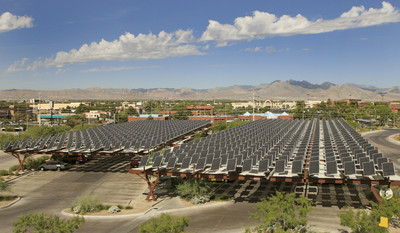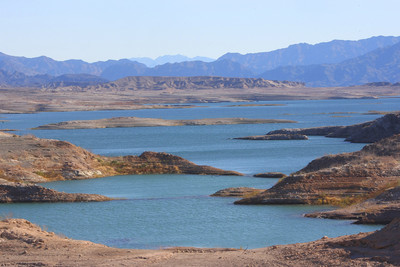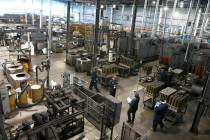RUN-UP TO THE WARM
What's spurring regulatory action? Studies such as a July report claiming Nevada could suffer serious economic losses from global warming, for one.
The University of Maryland study, called "Climate Change and the Economy," asserts that a 3- to 4-degree jump in spring and fall temperatures and a 5- to 6-degree gain in winter and summer temperatures in Nevada by 2100 would yield a drier climate in the Silver State. Dwindling water supplies could affect tourism, development and public health, and could cost the state "billions," the report states.
For example, a water shortage might curb residential and commercial construction. Building and development rank as the state's second-biggest job sector, and an industry contraction of 65 percent compared with current building activities would mean $3.6 billion in lost revenue for state and local governments, the study said. An accompanying drop in consumption and labor availability would pile on $4.7 billion more in losses annually.
The Maryland report's authors said they couldn't pinpoint the "full effects of climate change" on Nevada's tourism economy, but they did note that outdoor activities such as fishing, hunting, wildlife-watching, hiking, water sports and golfing would bear the biggest brunt of temperature increases. Take golfing: With less water available for irrigation, course operators could replace vast swaths of green with desert landscaping, a move that might turn off consumers. If the state's golf sector dropped 25 percent of its business as a result, the Southern Nevada economy alone would lose $194.1 million in economic output, 1,120 jobs and $28.6 million in personal income.
Plus, dropping water levels at Lake Mead could curb boating, fishing and water skiing, and greater wildfire threats could limit visitor volume to Nevada's state parks.
"There are lots of excellent economic studies that assess the cost of cutting down on greenhouse gases," said Matthias Ruth, director of the Center for Integrative Environmental Research at the University of Maryland and one of the report's authors. "We've summed up those studies collectively as a society and said, 'Whoa, that's a staggering amount.' We've thrown up our hands. But what we've forgotten is that there are costs of inaction as well."
Another recent study cited the job growth that could come from focusing on renewable energy projects.
The Center for American Progress and the Nevada Conservation League released a report Tuesday that predicted the creation of 15,000 jobs in Nevada based on an $865 million investment in building retrofits, mass transit and other green initiatives. The money for the projects would come from a carbon tax on businesses.
Some experts disagree with the Maryland study's bleak outlook.
Robert Mendelsohn, a Yale University professor of economics and management, said global warming could actually spur economic gains for the nation, though less so for Nevada in particular.
The country's agriculture sector will benefit from longer growing seasons, and that improved output will largely offset any losses from climate change over the next century, Mendelsohn said.
But Nevada's agricultural sector is small, and farms here already endure relatively warm weather, so "increased temperatures will not be your friend," Mendelsohn said.
Still, Mendelsohn said, summer recreation seasons here may last longer, and that could help the local economy.
"My guess is, Nevada is probably going to see both wins and losses," Mendelsohn said. "It'll be a hard call to make as to where you'll end up. In a scenario with just a 2- or 3-degree increase, it'll be pretty much a wash. As you move into hotter scenarios, I'm guessing you'd move into the more harmful range."
And Andy Matthews, vice president of communications for the Nevada Policy Research Institute, said no scientific consensus exists on whether global warming results from human activities, or whether humans can halt climate change through policymaking.
"(The Maryland study) itself even stipulated that its conclusions were all based on certain projections that may or may not turn out to be accurate," Matthews noted.
Experts who either disagree with climate change forecasts or who assert humans can do little to thwart natural global warming include John Coleman, meteorologist and Weather Channel founder; Bill Gray, a pre-eminent national hurricane forecaster and emeritus professor of atmospheric science at Colorado State University; and Fred Singer, professor of environmental science at the University of Virginia.
Regardless of where observers stand on the science of climate change, all sides agree that entrepreneurs will find a bumper crop of business opportunities amid concern for the environment.
"There is a lot of money to be made in furthering the claim that global warming is a significant problem, and a man-made problem," Matthews said.
Nevada Gov. Jim Gibbons created his Climate Change Advisory Committee in 2007, and that group in late July released a 28-point plan to help stem greenhouse-gas emissions in the Silver State. Their priorities could provide a road map for companies seeking to launch ecofriendly ventures.
The recommendations call, among other measures, for tighter management of residential and commercial energy demands; more energy-efficient building standards; additional support for brownfield development; "clean-fueled" public transportation; incentives for ethanol-blended fuels and biofuels; a high-speed train between Los Angeles and Las Vegas; efforts to convert dairy-farm manure to energy; enhanced solid-waste recycling efforts; and initiatives to capture and sequester carbon dioxide from power plants.
Few limits exist on business prospects related to climate change, said Somer Hollingsworth, president and chief executive officer of the Nevada Development Authority.
"We're very excited about it," Hollingsworth said. "We think Nevada has a chance to really be in the middle of that whole universe."
Hollingsworth noted that major investment banks have set aside tens of billions of dollars for solar plants and other sustainable businesses.
Businesses related to renewable energy contain Nevada's best economic prospects for capitalizing on climate concerns, Mendelsohn said. In wind energy and solar power, the Silver State has rich resources to tap, he said.
In 1997, Nevada became one of the first states in the country to adopt a renewable portfolio standard requiring a certain share of its utilities' energy to come from environmentally friendly sources. Thanks to those standards, Nevada leads the country in geothermal and solar power per capita. Two of the world's largest solar projects operate in Southern Nevada: the 64-megawatt Nevada Solar One power plant near Boulder City, and the 14-megawatt Solar Star photovoltaic center at Nellis Air Force Base.
The state also houses three new geothermal plants, with an additional 26 projects under contract. Sierra Pacific Resources, the utility that owns Nevada Power Co., plans to double its renewable energy portfolio by 2012 to nearly 500 megawatts.
Manufacturers have jumped in as well. California-based Ausra in June opened a 130,000-square-foot factory in Las Vegas, where it assembles solar thermal mirrors, tubes and turbines for solar power plants.
Nevada would also do well to attract companies specializing in technologies that reduce or capture greenhouse gases such as carbon dioxide, Mendelsohn said.
Maryland's Ruth noted that Nevada's economy could benefit from climate change prevention in indirect ways, too. "Smart" land-use planning -- designing communities efficiently to reduce the need for driving -- could cut down on greenhouse gas emissions and reduce fuel costs for citizens as well. Those savings in turn could bolster other sectors of the economy, as consumers would enjoy more discretionary dollars.
And some policies could both reel in greenhouse gas emissions and fatten state coffers, Ruth said. Maryland officials recently joined other East Coast policymakers to develop a mechanism that would auction permits allowing power companies to release greenhouse gases. Utilities uninterested in buying permits must invest instead in improving fuel mixes and reducing emissions. The permit auctions could generate $100 million a year in revenue for Maryland alone, Ruth said.
Regulators should avoid policies that would hurt commerce, though, other observers say. Over-regulation could do more harm to the economy than global warming will cause in the near term, Mendelsohn said.
"As far as we can tell, the best strategy is to be moderate," he said. "Begin to regulate, but regulate moderately. Don't make it very expensive at first. The damages right now are actually pretty low, and we don't have good technologies that cut greenhouse gases. You don't want to spend $1,000 to solve a $10 problem. But if you can spend a few dollars to solve a $10 problem, that's great. As we accumulate more greenhouse gases in the atmosphere, we can get stricter in the future."
Matthews agreed that costly rules and regulations would only hurt consumers and businesses. Consumers will pick up some of that $100 million permit tab in Maryland, for example, while utilities might restrain research and development funds to cover the rest of the cost.
"Global warming as a cause is easy to get swept up in," Matthews said. "But we need to resist calls to put into place policies that will do little for the environment and only transfer more power into the hands of government. Those kinds of policies will rob the private sector of the tools and resources it needs to really drive technology forward, and those new technologies might have included many that would help the environment."
This story first appeared in the Business Press. Contact reporter Jennifer Robison at jrobison@reviewjournal.com or 702-380-4512.





























